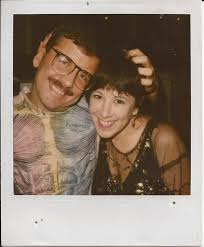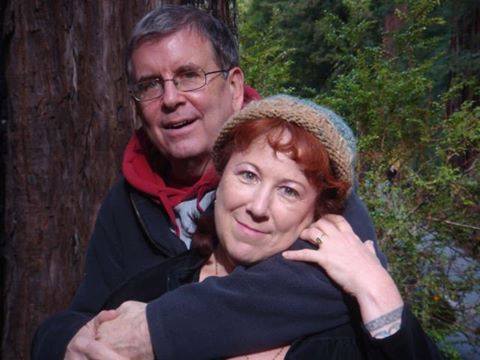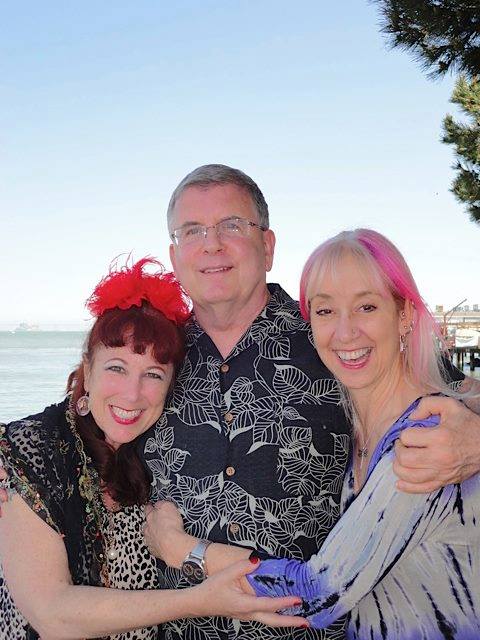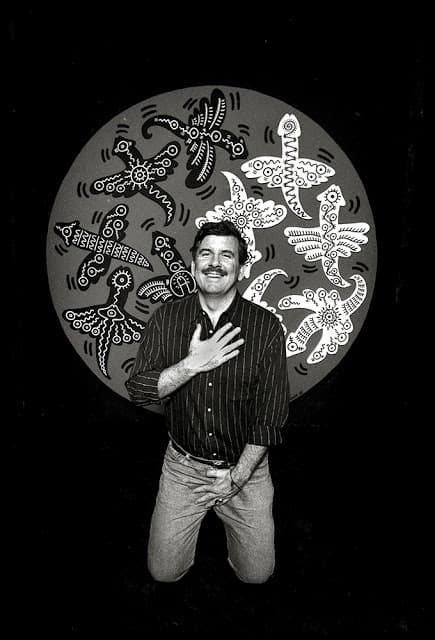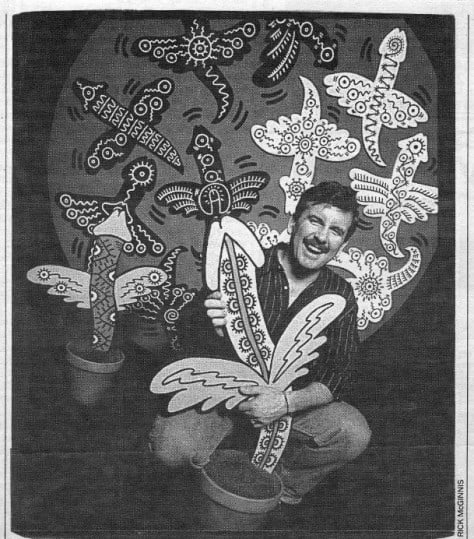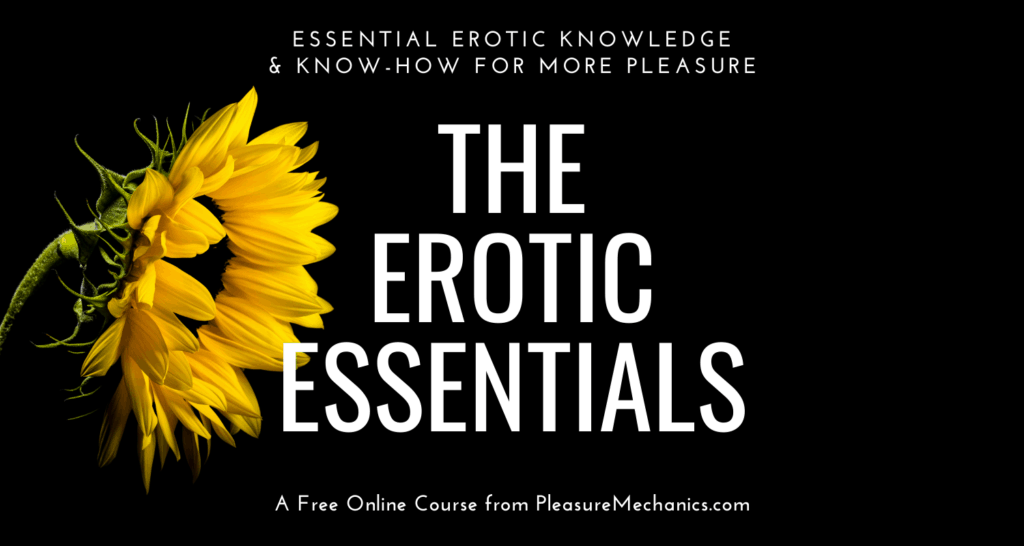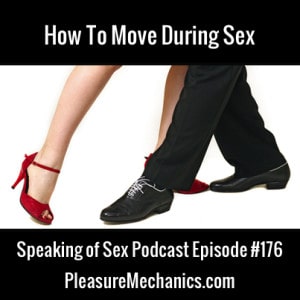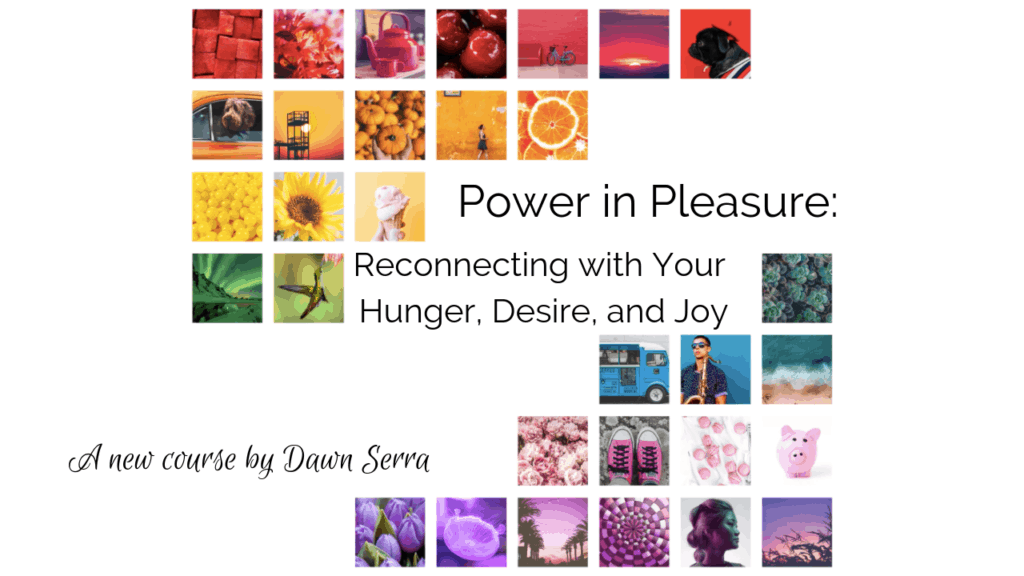Podcast: Play in new window | Download

In part 1 of our interview with Joseph Kramer, we learned about how he grew up as a masturbation loving gay boy in the Catholic church and left the Jesuits after receiving his first massage. We discovered the origins of the erotic embodiment practices he gathered as he explored a new way of sharing sexuality amongst his gay male community at the dawn of the AIDS crisis, and about how he began to integrate the skills of breathwork, massage and erotic touch into the experience of Taoist Erotic Massage.
In this episode, part 2 of our interview with Joseph Kramer Ph.D., he tells the story of starting the Body Electric School and how he began teaching erotic massage and embodiment practices to groups all around the world. He shares his unexpected love story with erotic artist Annie Sprinkle, and how they developed the vulva massage version of erotic massage. We also learn about how great erotic touch teacher Chester Mainard found his way to Body Electric.
Joseph Kramer, Ph.D., has trained countless people in the art of erotic touch, including most of the leading tantra teachers, sex educators and somatic sex educators all around the world. Are you next? Check out his library of erotic education here : * EroticMassage.com * and tap into his global network of trained professionals here.
Podcast Transcript for Interview with Joseph Kramer Part 2
Podcast transcripts are generated with love by humans, and thus may not be 100% accurate. Time stamps are included so you can cross reference or jump to any point in the podcast episode above. THANKS to the members of our Pleasure Pod for helping make transcripts and the rest of our free offerings happen! If you love what we offer, find ways to show your love and dive deeper with us here: SHOW SOME LOVE
Chris Rose: 00:00:00 Welcome to Speaking of Sex with the Pleasure Mechanics. I am Chris from pleasuremechanics.com and on this podcast we have explicit and soulful conversations about every aspect of human sexuality. Come on over to pleasuremechanics.com, where you will find our complete podcast archive, and while you are there go to pleasuremechanics.com/free and sign up for our free online course, The Erotic Essentials, so we can get you started with our favorite strategies and techniques right away. That’s pleasuremechanics.com/free.
Chris Rose: 00:00:40 On today’s episode we are continuing our conversation with Joseph Kramer, PhD, my great erotic mentor and developer of erotic massage. In last week’s part one of the interview, Joseph Kramer shared his story of growing up a gay Catholic boy, joining the Jesuit priesthood, and then leaving the priesthood after he received his first massage. Massage was an awakening that would take Joseph Kramer back into his body and launch him into his lifetime of erotic service. In today’s interview Joe continues his story and tells us about spreading erotic massage all around the world. Joe talks about his friendship with the great erotic artist, porn star, sex educator Annie Sprinkle and how they collaborated in their unique way to develop an erotic massage for the vulva. And he also talks about Chester Mainard, my other great teacher. How they met and together really developed and worked on the massage for the anus and prostate. So what we have here is a story of how these three erotic massages … Erotic massage for the penis, for the vulva, for the anus and the prostate. How all of those touch skills came together and how Joe taught these skills to the world.
Chris Rose: 00:02:19 Because I think what’s so important to recognize about Joe’s career is not only did he start The Body Electric School and then The New School for Erotic Touch. Not only did he start a profession called sexological body work that is now spreading around the world, but he also focused on creating media. He produced over 100 hours of erotic touch education. And he was early in the game. He was producing VHS videos of his classic erotic massage teachings. And those videos and then DVDs and now streaming media have trained hundreds of thousands of bodies. And his media in combination with his international teaching circuit means that Joe Kramer and his staff have trained so many of the sex educators we now know and love. So many tantra teachers and sex educators and somatic sex educators. So many people who went on to live their lives and teach about sex and grow into professional sex educators learned their touch skills and embodiment work from Joe. So this is the story of Joe Kramer, Annie Sprinkle, Chester Mainard. Three erotic pioneers who loved touch, who revered the body, who believed in erotic transformation, and who together developed a body of skills about how we can touch the most sensitive parts of the human body with love, with reverence, with respect.
Chris Rose: 00:04:11 And as Joe says at the end of this interview, what happens when we put our attention on this most precious part of the human body? What happens when we put our life’s attention on the erotic? Joe Kramer, Annie Sprinkle, and Chester Mainard are my three erotic mentors that brought me to start Pleasure Mechanics and gave me the gifts that I have spent my life sharing with the world. So I hope you enjoy this story of Joe Kramer traveling the world, meeting other erotic pioneers, and setting into motion a lineage of erotic touch that would go on to massage the world into a more pleasurable place. Here is part two of my erotic lineage interview with Joseph Kramer.
Chris Rose: 00:05:07 When did erotic touch and erotic massage start being taught in formal circles as part of Body Electric?
Joseph Kramer: 00:05:18 The Jesuits taught me the power of having a structure in which to work. And like a school, they have schools everywhere. So let’s start a school. So using Walt Whitman’s wonder phrase Body Electric … Which I had come to name this erotic awakening, the aliveness of my body, Body Electric. I was looking for images that matched what I was feeling and so here the great American poet Walt Whitman, the great American homosexual poet, used that term Body Electric and I go, he knew it too. He knew this feeling. So I started the school, named it Body Electric but I had no intention of that experience of eroticism being part of it. And I’d gone to five different massage schools. I’d taken classes in five massage schools. And some of them where in the Bay area, in San Francisco and Oakland and Berkeley and they were blatantly or less than blatantly homophobic. Two men would never work together. And I thought, there’s a need for a place that’s not a gay massage school but that it’s not homophobic. And so that was the idea of Body Electric as well as, oh this is what I want to do for my life.
Joseph Kramer: 00:06:35 And so in 1983 I spent a year preparing. I took classes in anatomy, I pulled teachers together. Every week I taught a different class for free or for cheap to learn to do face massage or to do feet massage, so I prepared for a year. In 1984 California gave me a license and approval to teach massage and to certify masseurs. So that was 1984. What had happened starting in late 1981 in this area is, it was the beginning of the AIDS epidemic. And New York and San Francisco were the two places where this was most prominent and I’m 10 miles away from San Francisco and working with gay men. So in ’82 and ’83 and ’84 … Until 1984, they didn’t even know HIV, they didn’t even know what was causing this. And it could be airborne or whatever. So there’s huge fear, especially around gay people. People didn’t want to have gay men around them because these were the people who were getting sick and dying and had this plague. And I was touching gay men and it was an important time because they had fear and terror in their bodies. And I found how emotion is contagious because I would feel it but I would somewhat take it in in giving sessions. So it was really important to shake this out.
Joseph Kramer: 00:08:13 And I remember the first man I found out he had AIDS and he’d been my regular client. And I found out he had AIDS one week. And he came back that week and I was scared to death to touch him. And I remember after that massage I went into my fear. But after that massage I was never afraid to touch someone, and I knew AIDS was not about touch. That you couldn’t … Even though one of the main manifestations was these spots all over the body, Kaposi Sarcoma, and that was really big. So I felt, how can I be of service to what’s happening because it was so crazy? So people who were of service to these people, when I started the school in 1984 I put out that they could come and take classes for half price. I would say several in each of my classes, in my short classes and longer classes, were people who worked with people with AIDS. And so I started to get a feel and a sense on a different level of what was happening.
Joseph Kramer: 00:09:28 And actually about a year later, 1985 I thought, erotic massage is this blissful … It’s almost my sexual preference. It’s one of the main things I love doing. You know, do you want to fuck? Do you want to suck? No, let’s do erotic massage. And then we can do those other things but let’s start there. I’ve met a few since then but I had never met anyone before that who their hands were their major sex organ. But I guess maybe that was with me. Anyway, in 1985 I thought, I know ways that I know are safe that gay men can have sex. So many men were continuing to get sick. And so I decided I was going to offer a class in erotic massage in one big class. And I did. And man of the people went into the same states as my individual clients. They had amazing experiences. Transformative experiences. And I taught Daoism. I was really … Acupressure and Daoism was my system. And in Daoism, the goal is often for men not to ejaculate. To ejaculate as little as possible. Which I didn’t have any real context for because I liked to ejaculate also. But in the AIDS era this was put out that Daoist, this is something that doesn’t involve the fluid that has HIV in it.
Joseph Kramer: 00:10:55 So, in 1986 I started teaching much more classes. By that time I called this massage that I was giving Daoist Erotic Massage. Because I advertised, come and get it, pleasurable massage that doesn’t involve ejaculation. And so it was a teaching for most men. People came to me looking for this experience of an orgasmic experience, a pleasurable experience that was the erotic massage and it involved breathing, erotic touch. It involved a whole body massage. I gave people a massage, relaxed them. In giving someone a massage there’s an attunement that happens. And there’s a trust. They know how much they can trust and let go on this massage table. And how skilled, they can feel how skilled I am to be with them. And so there was a wonderful place to go from there and to the erotic. And the erotic, especially masturbatory is probably one of the most … It’s so laden with habit. People get into the exact way to get the best experience and do it again and again. So some men masturbate the same way they did when they were 14. So my experience was helping people to get out of habit, teaching them breathing which can keep them present in their experience. Spreading the feelings, the excitement throughout their body beyond where they normally would.
Joseph Kramer: 00:12:23 So while giving a massage one hand often was doing other things. I’d be working on the toe and the cock at the same time. And I called it double attention. That sometimes the pleasure, the erotic pleasure would … That way of feeling would just go there to the other place. Or I was spreading it out. I was waking up the tissue so these feelings could spread out. And so that was Daoist Erotic Massage. And I knew it was powerful and I’d done these short classes. And then a man invited me. A man called my from New Mexico and said, “I’m in a group of men, about 30 or 40 men and we are friends and we’re a communal network that has sex with each other.” And this was again, tied right into my experience. And he said, “Can you come and teach us some ways to have sex with each other that are safe, that we’re not going to get AIDS from?” And I said yes.
Joseph Kramer: 00:13:29 So I worked out this structure for a two day class with these people. That structure has been done 1,000 times since then all over the world. And there still is a school teaching that structure. And it was just a class where the whole first day was play. It was, I started out with breathing in the morning. People did breath. And they had breath orgasms and they’re breathing their body. And they were naked. And there were all kinds of exercises involving breath. I dad drums that I would play. I had music that had rhythm in it so people would get into group experiences. There were short experiences, longer experiences. Different ways of breathing. And I would guess that 90 plus percent of people in those classes had never done conscious breathing to that degree. But when you breathe naked and playing there was a high that people got into. They were now into a communal embodied place as a group naked. And so many people have issues being naked. Taking off clothes is rough, but after breathing, we’re all in this. It’s like again, the garden of Eden almost. This paradise. Some place where we’re beyond that. We got beyond that.
Joseph Kramer: 00:14:51 So in the afternoon I did this thing called first touch. The first time somebody touched your penis. And you could be hard or soft and there was this however they could get into it or looking carefully at the penis and exploring it. And people telling each other about how they masturbate and the pleasurable parts of their penis and showing and stroking. So it was an exploration of playfulness and breathing and arousal as much as possible but not required, but arousal. Because another level of this was that soft cock massage needs to be just as pleasurable and available. And if somebody’s not hard they have this … This is the days before Viagra and Cialis. But there’s a judgment, like I can’t get hard. But people who were soft found pleasures of soft cock. So we played in all these different realms through the afternoon. In my construction of this, I thought to really go deep into the erotic massage, we need breath, we need some comfort with bodies, and the communal. So at the end of the first day I would say we have now done 10% of where we’re going to go in this weekend.
Joseph Kramer: 00:16:13 There was always this statement like … Most people had gone way beyond they’d ever gone in a playful erotic way with men. By the way, the other thing was about beyond judgment and my type. So I had all kinds of exercises where you moved to the next person. And so in the exercises everybody equally worked with everybody else. The big surprise for a lot of people is, oh I don’t want that person to touch me. And wow, they touched me better than anybody else. And so we saw that our visual type is not the best for our somatic, our sensual type.
Joseph Kramer: 00:16:58 Then the second day I did a Daoist Erotic Massage. And the way I did it was … And it was often an hour and a half to two hours. And it was a little bit of massage in the body but less than 10 minutes. It was mostly genital and massage. There was a massage of the back, 10 minutes maybe. Everybody was at tables and I would teach. I would demonstrate and show a stroke, very shortly, one minute. And say, try that on your partner. Or these two strokes, and then play and you have eight minutes. And they would do this and try and play. And they could talk but for the most they don’t have to. And then at the end of the eight minutes, it’s say goodbye to this person and there was a movement to the next table. So in a massage you got to touch a little of people, maybe not everyone depending upon how big the group was. But at eight minutes, eight minutes, eight minutes, sometimes five minutes. And so a variety of men touched you and a variety of men you were touched by. Some people liked to put blindfolds on so it was about their experience and I highly recommended that.
Joseph Kramer: 00:18:15 And the goal in each of these, after I taught try these strokes then we all breathe together while they were starting to try the strokes. And I had drums again, or music. And I am so lucky I took this class in breathing because breath is a way that keeps people present. And these classes wouldn’t have worked without breath. The breath just … People often go away into thinking and judgment and then it wouldn’t go to the high place. When everybody stays there by breathing, it worked. Anyway, people would move from table to table. And at the end there was just this coming down, just relaxed. And that was the end. And so I did that structure in New Mexico and it was exactly what those people wanted. And I was invited back to New Mexico three times a year for the next three years. And it was one of the places … And I’ve met people in New Mexico that became formative in my life and are still the closest.
Joseph Kramer: 00:19:24 Just this morning I was talking to somebody from that experience. I took a breath class, another breath class from somebody, and he taught me a thing called the big draw. And Mantak Chia in his book had a thing called the big draw that I never got into. But this was a different version of the big draw where you breathe and you’re very intense. You’re in the breathing, you’d feel the excitement in your body. And then you clench your body. You’re lying down. You clench your butt, you clench your muscles. You hold, you take a deep breath and hold it for 20 seconds or 30 seconds. And hold it and then relax. And this experience, it’s hard to describe. It’s an experience that people can have, they can breathe and try this. But it takes one very quickly from one state to another. You’re in this pleasurable state and you’re feeling erotic massage, you’re feeling breathing, and all of the sudden you’re in this … It’s almost like … I can say, like a psychedelic state. And everybody doesn’t go to the same place but people talk to their dead relatives and dead friends and a lot of people saw God. A lot of people saw nothing.
Joseph Kramer: 00:20:38 There was actually Buddhist who saw … I understand nothings now. And I knew people went to amazing places because I did this one on one. But now it was happening in a group. At then end of the Daoist Erotic Massage I would always say, “Would anybody like to share about their big draw?” Because they had this whole session that that was culmination. And it became really … There was just amazing experiences. And years later I left Body Electric and teaching that specific method in ’92. So it’s 25 years later, I meet people in the street, I meet people in different cities and they say, “I took a class from you.” And I say, “Oh, what was the big draw? What was your big draw?” And they know it and they say it was formative. And some people didn’t have any experience because they held it or they didn’t do it. It was quite a powerful class. And I taught it a couple of times in New Mexico and then I decided I would teach It in San Francisco and Oakland. And The Advocate which was a National Gay Magazine … So they did a front page article. It was on the front page. And after that I got invitations to teach this in cities all over the United States and Canada and then Europe.
Joseph Kramer: 00:22:04 And within a year, 1987, because of this article I was teaching in 25 different cities. Every weekend I was going someplace.
Chris Rose: 00:22:14 Celebrating the Body Erotic.
Joseph Kramer: 00:22:16 It was called Celebrating the Body Erotic and it’s still called that. And what’s interesting is it served people in the AIDS era and now I talk to people, it serves different people. A lot of people in that era who took these classes from me, a lot, became therapists. Or some became therapists. And they are recommending to their clients … Maybe people who have been in a heterosexual marriage and are coming and divorcing, coming out as a gay person or as a bisexual person. So they are sending their people to Celebrating the Body Erotic to have this communal erotic experience because they know what it is. I didn’t just sit down and work this out. My life has been like a process where I’m bringing things in and trying it. And my massages, I would take a class and try one thing from that class in my massage. And so the class constantly changed.
Chris Rose: 00:23:19 And one of the things about the early Body Electric days that strikes me is that beyond these workshops you were weaving an international fellowship of gay men. And Body Electric became this touch point and organizing principle for a certain community of gay men. And it was gay men who wanted to feel empathy and erotic connection to one another in this time of fear as you said.
Joseph Kramer: 00:23:49 So one of the things … I now can look back and name it more easily. But one of the things was we were exploring not a normal experience of sexual arousal. It was communal and it was intense and we were present more than maybe some people are in their sexual experience. So it was incredibly what we would call embodied. People were really in their body, amazingly so. And they go, I want this. So I was actually offering the experience, a version of the experience that I had from that priest. That didn’t involve my penis. But it was where I woke up and felt I have a body and I can live my life in this body and with this aliveness. That was the foundation. People having this embodied experience and that they could do this with people they didn’t know well or that they knew well, or with their lovers. There were so many people who met lovers in that class. And one thing I’m proud of is in just a few years I would guess three or four hundred people left their jobs and became erotic masseurs giving this massage. There are people go, I want to do this all the time.
Joseph Kramer: 00:25:09 The first time I went to Berlin I looked in the paper and there were people advertising Body Electric Massage. This is because of that experience. So it’s this embodied experience which is the foundation for powerful connections. I think when you have that communal experience people wanted to stay with these people and community. And for most people it was involved in the city you were in so the people in New Mexico got more intense. But there was a huge community in Atlanta and in San Diego and Minneapolis and in Toronto. And they would have potlucks and erotic massage nights and all kinds of gatherings because these people wanted to come together to foster this sense of aliveness. At this time early on was the epidemic kept getting worse. Until 1995 there was no end. It was just a quick death sometimes. There was poisonous medications. So there was this huge fear of sex and this was a sexual community of people who had a type of sex and knew a type of sex that was joyous and fun and could be the basis for relationships and communal relationships.
Joseph Kramer: 00:26:33 When this got bigger and I traveled around the world and traveled around the United States more and more people traveled from one city to the other to take this and met each other. So there were networks of people meeting each other who had this experience and wanted more of it. And many people were very creative in taking this and going their own directions. And starting classes on their own and teaching different embodied things for gay men. So there was a lot of this happening. And the best thing for me is, I never in all my traveling for years, stayed in a hotel. I stayed in people’s homes who invited me there. And there became this network. This really started in ’87. What happened in 1990 is I decided I wanted to have a longer class and invite people who had had this beginning experience to go deeper. And I took Walt Whitman’s phrase, the dear love of comrades, and I had this six day class. And people came and they did go deeper. And here’s where people from all over the world including from Europe met each other, and so this is where the international network and then the national network really got intense.
Joseph Kramer: 00:27:56 I then saw a lot of people were going from these classes to become erotic masseurs. And right in 1988, Nancy Corbett-Qualls published a book called The Sacred Prostitute. And I realized that my background in the Jesuits was to be of service. So here were a mythology of people who were of service through their body and through a body experience. And so I decided and I recognized that there were sacred prostitutes in classes. I could see, that’s their gift but nobody affirms that gift because who can recognize that? And I found that that’s one of the things that I did a lot. I could see who had that gift. Anyway, one year later I still taught dear love of comrades but I taught a thing called Sacred Intimate Training. And I used the term sacred intimate, I was going to use sacred prostitute but again, people said … For some people it was not a word they wanted to use, prostitute. So sacred intimate became those who wanted to be of service to the culture. And again, these are mostly gay men and so it was about how to be with people when they’re dying. That was part of it. And how to be with people to initiate them into this way of sex. So it was all body based.
Joseph Kramer: 00:29:22 And the Sacred Intimate Training people came from all over the world. And there are still other groups of people have used this term and offered trainings in being of service through the erotic so I’m kind of very happy with that.
Chris Rose: 00:29:39 So can you talk about one of these workshops you were teaching, as far as I understand it was an exotic breath work workshop, and along with 25 gay men there was also a woman named Annie Sprinkle? Can you talk about meeting Annie Sprinkle, how you too really started what has been a life long love affair? You call each other spouse and husband and wife. And this was my path to you is through Annie Sprinkle. The two of you are very much comrades. So how did you meet Annie and how did your work and collaboration start to unfold?
Joseph Kramer: 00:30:16 This is one of the most important … This was like that massage. It was my most important encounter. But I got a call one day in my office and this woman was editing Penthouse Forum and it was Annie Sprinkle. She was focusing on spirituality and she heard that I was doing a gay spirituality. But Penthouse really had nothing gay about it. But I put out some audio tapes about Daoism in this that she somehow found and listened to, called Ecstatic Sex, Healthy Sex. So she called to say hello and that she wanted to sell these in Penthouse and talk about them. So she put this big ad in. I think at that time it was huge. It was like four million copies. It was not the big Penthouse, it was Penthouse Forum, it was smaller. But four million copies and I think seven people ordered those tapes from a good gay gay gay[inaudible 00:31:15]. I met Annie Sprinkle on the phone and so I was going to New York to teach. I decided I wanted to meet her and she wanted to meet me. We met and that first meeting we sat in a coffee house. And it’s easier to look back and see it but I felt it right then. It was something extraordinary.
Joseph Kramer: 00:31:38 Now I can name, here is somebody who’s had a similar awakening in their body. She had had this awakening through the erotic also. Different, but similar. It wasn’t as communal although she did have a communal sense. And she had been a prostitute. She’d been in porn, more than 100 porn videos. And she was also concerned about AIDS and doing AIDS work. But this was 1987 I guess. Anyway we talked about everything. There was just this connection. I don’t like the term soulmate, but if I ever would apply it it would be to Annie. And so for 35 years, whatever ’87 is, we’ve been intimate. There’s never been a time … She lived in New York and I lived here. Even that there’s … We’ve been intimately connected. She and I moved to the Bay area. We don’t live together. We’re closer now than ever. Luckily erotic massage is … She likes my emphasis on erotic massage. Although as a gay man I did have a sexual relationship with her. I remember her early on, having sex with her and she could just read what’s going on and she goes, “Oh this is okay, you can keep going, you can be a gay man and do this, have sex with me.” I’m like shut up Annie.
Joseph Kramer: 00:33:14 Anyway, she was quite a force. She’s a force of nature. She’s an artist. But part of it is sourced in the erotic, in her wisdom and knowledge of the erotic and so was mine. At this time I was in the middle of it, I didn’t know this, I didn’t have the vision of this about her and me. But we were like this. And right away she said, “Why don’t you do this Celebrating The Body Erotic for women? I want you to do it for women. And women need this.” And eventually I did create a massage with her for women. And it is taught for women and it came from Annie Sprinkle.
Chris Rose: 00:33:57 Do you mean you started giving her a full body massage and then together because you had this connection you were able to kind of map their erotic massage you were doing onto her vulva and start articulating that vulva massage?
Joseph Kramer: 00:34:11 So what happened is I said, “The vulva is uncharted territory for me. I am an expert on throbbing penises but vulva’s, no.” And I had rather limited experience as a gay man who was a Jesuit for 10 years and then wandering through the gay underworld. And there had been just a couple experiences with women. But what happened is at one point I said, “I want to develop an erotic massage.” And it didn’t work. We sat, rather than within a massage, and went through her vulva and tried different strokes. So I explored her over a long period of time. This developed over I would say, the core of this massage, and we named the strokes and things, it’s probably five different sessions. But I remember she was doing a performance at Highways, a performance center in L.A. She had an hour and she said, “Well let’s work on some massage strokes.” Because it was pleasurable and we just tried things looking for arousal. Anyway, I met her and she wanted to come to classes and I was teaching a class in breathing for gay men at a yoga studio on 14th street in New York. This is again in ’88 probably.
Joseph Kramer: 00:35:47 So I said, “Sure, why don’t you come.” And there were 50 gay men who came to this breath class and Annie. And we did all this breathing. And one of the exercises, when I had people go in the middle of this circle, it was a big circle. To feel what it’s like to be in the middle breathing or five men go in the circle. Well then Annie said, “I’d like to go in the middle.” And Annie went in the middle. She was breathing and she went into this state that was beyond description and she had this orgasmic experience that everybody could feel and she was using everybody else’s experience so she was like the assemblage point. Some shamanic work we call it. And it wasn’t erotic, we had our clothes on. Our clothes were on for this experience. She had this experience and she has told it later that it was the most intense experience of her life up to that point. I said, “Yeah, you had sex with 50 men.” But it again, she trusted the power and shen knew how to let go. That’s it, that’s part of some real sexual wisdom to let go into the unknown and invite the creativity in and she did at that time.
Joseph Kramer: 00:37:04 I remember going home and saying, “Yes we have to develop Celebrating the Body Erotic for women. I’ve only been working with half of the population.” The other thing that Annie Sprinkle did is she was on a lot of college campuses and saw a lot of college sex radicals met her. And they would then after they graduate, some headed to San Francisco because it was a place of great sexual exploration.
Chris Rose: 00:37:38 Sounds familiar.
Joseph Kramer: 00:37:38 And Annie would … Often I would meet them and that’s how I met you. Through Annie Sprinkle. But the people who work with me now for 25 years, I met through Annie Sprinkle. It’s almost biblical. My people will be your people. An old testament marriage. Here we are together. And so we’ve done projects together, I’ve written part of her book, she’s helped me with videos. We’ve made videos together. She’s my fiercest critic. So I’ve made 100 hours of video, sex education video and I was doing one early on with her. And I brought some lights that I had bought at Woolworths that were like light in which you plug in and clamp on. She goes, “What are those?” And I said, “They’re the lights.” She said, “Joe, the worst porn video that I’ve ever been in had more lights than that.” At that point I realized from that point on, I had the best video cameras, the best lighting, the best people, the best sound. It’s like if I want to communicate something she’s right, let’s do the best. Let’s have the highest quality possible. Thank you Annie.
Chris Rose: 00:38:57 So what up until this point was the awareness of the anus in the work and how did you meet Chester and how did Chester’s teachings get integrated here?
Joseph Kramer: 00:39:14 So early on in my massages … About this, about first the anus, and then to Chester Mainard. For some men … Let me go back. The statistics in the ’70s were that only about 20% of gay men … In fact, before the ’70s, in the ’60s and ’70s. Only about 20% was anal sex their major way. Although this is what was thought. Oral sex and masturbation with men was furtively or whatever was more common. But many of the men who came to me for massage when I was giving this Daoist Erotic Massage, their major way of having sex had been anally. And so in the AIDS day this was a taboo. And in about … I don’t remember. In the mid to late ’80s, Ray Stubbs was a sex teacher, a heterosexual sex teacher, and he had an accident and has been in a wheelchair for the last 30 years. But this is before the accident. And in the AIDS era he was very careful. He was one of the first ones to really bring gloves and hygiene to heterosexual environments. But he offered a class in anal massage. And he invited gay men because he wanted to explore this.
Joseph Kramer: 00:40:40 And I go, oh my God. And so I took this class. But I had tried a little bit anal but I’d never really had a class where there’s a pedagogy. There was some hygiene, first it was a bathing. And then there was external sphincter and the internal sphincter and penetration. And so he taught it like a massage class and I was a massage teacher and that was an awakening. I then took that, not exactly the structure but he initiated me and gave me permission to do that. And that was then in my individual sessions and in … I thought, I’m teaching these classes all over the United States. I thought, I can include the anus. So the first time I did was in 1990 when Dear Love of Comrades, when people came from all these places who’d had the erotic massage experience, I also included maybe one or two anal there. But I may have taught some shorter anal classes, I’m not sure. But when I started to teach it again, it was my hands recognizing the importance of this part of the body to the degree that I hadn’t and that I had been separated myself from my own pleasures.
Joseph Kramer: 00:42:03 And in my explorations I found probably less than 10% of the men had included their anus in masturbatory play. Those that did, I would call creative people and were really explorers. What more is possible? And I think a lot of heterosexual men as boys explored their anal area. It was just a pleasurable place to include with masturbation. So it became something that I taught in small doses until about 1990. But in 1990 later on in the year there was even a six day class and the teacher for that was Chester Mainard. And it was called, Exploring The Land Down Under. And Chester, I know kind of our meeting. I taught a class in Minneapolis. One of the early, I think 1988, of Celebrating the Body Erotic and Chester drove up. He was in Madison, Wisconsin. So he drove to Minneapolis and took this class. And I really have no memory of him in this class, although he said we talked. But I talked to lots of people. Every week I was meeting 25 to 40 men with their clothes off and for the most part I wasn’t talking, we were breathing and doing all these exercises. But he took that class.
Joseph Kramer: 00:43:26 A few months later I taught a class in Madison, Wisconsin. And he had contacted me and said, “I really want to talk with you.” And most of these classes were these weekend classes where you go home at the end of the day. This one was at a retreat center. It was actually at a … It used to be a convent, a monastery for nuns. It was a convent. So it was a retreat center now. And Chester said, “I’m coming and I want to meet you and talk.” Because he felt that there’s … He was really moved and resonated. So I remember going there and meeting him and getting to know him. And talking, he asked me all about what I was doing at Body Electric and told me some of what he was doing and he also was involved with AIDS education. He was also involved in the medical school where he helped doctors learn to give prostate exams. I go, “Oh, I’m just starting to explore anal areas also.” So that’s where I met him and that still was contained. It was another person. It was wonderful and important. But I didn’t know how that was going to evolve.
Joseph Kramer: 00:44:44 The summer after I was there, which maybe was … Could have been ’88 but maybe ’89. He just showed up in Oakland at my school one day. He didn’t tell me he was coming. He walked in and I don’t know if he had a friend with him. And I remember sitting and talking him and feeling a sense almost like Annie Sprinkle where there was great … A resonance. You were talking about neurobiology. I know Daniel Siegel calls it interpersonal neurobiology. That your brain and all this, you’re interacting. Well it was happening. And he had been through two classes with me and sent friends and all this. So he had not used the breathing before so that was an element that he was using. He was a masseur also. Anyway, we talked and I was traveling so much it was difficult for me to run the massage school and to teach classes. Because I was also running a massage school that had non-erotic classes that trained massage therapists. And he told me he was a massage therapist so I said, “Good, do you want a job?” Because I resonated with him. He says, “Yes, I’m out here.” So I hired him and I remember I taught a class and he assisted me.
Joseph Kramer: 00:46:13 Then he taught the first class by himself and he became the most amazing massage teacher I have ever met. He taught breath classes. He taught a seven day breath class and it was the best class that I’ve ever been in, was that seven day class with Chester. Anyway he became known around the Bay area as a massage teacher and as a masseur. He was my masseur. He lived in the Berkeley Hills and he had a little place and it was wonderful and I went to him for massage. And we were colleagues and we did socialize. And I remember during that era I didn’t socialize a lot because every weekend I was traveling and he was teaching. And we were in the middle of this AIDS epidemic. I can’t tell you how horrible it was. It was really horrible. And yet there was these joyous things that we were doing. We were like light in the darkness with the things that we were doing, truly. And yet the darkness affected all of us. It was a wonderful and a terrible time. The most terrible time in my life.
Chris Rose: 00:47:29 Yeah.
Joseph Kramer: 00:47:36 And what happened is very quickly Chester came to be … I trusted him as somebody whose process was like mine. Taking in the new, using his creativity. And he wasn’t taking what I have and using it as a script. He would take some of the things but he was his own process. He was a very creative person and I was continuing in that too. And Annie is that same way. And Annie became good friends with Chester. Of course as part of this international network. So I wanted somebody else to teach Celebrating the Body Erotic. Because I was being invited all kinds of places, I was the only person teaching this weekend.
Joseph Kramer: 00:48:32 So I did a training for four other men. And a couple of them weren’t really good and didn’t really pan out, but Chester took that training. And he did that class and liked it and evolved it. And what he said … He was a good critic of me. He says, “Your version of it is way to Christian.” [inaudible 00:48:55] say anything Christian but I know it’s Christian. It’s my background. He says, “Mine is Pagan.” He came from some powerful place and I would call it shamanic. People might call what I do shamanic. It might be but he actually knew how to translate energy and feel and sense things. And he used his speaking. We both used our speaking. Differently for me. He taught it differently. And yet the effect was parallel and similar. So I knew that other people could teach this and take it their own direction. Chester’s shamanic magic and my … Actually my class … I’ll tell you, I don’t know how this happened. But during the big draw a half a dozen people saw Jesus every class. I never brought this up. People may have known my background. I never brought up Christianity.
Joseph Kramer: 00:50:03 And one friend Jean Curtin who also taught with me here in L.A., a beginner teacher, said that he judged how good the class was by how many people saw Jesus at the end. But Chester … What was interesting is nobody saw Jesus when he did it. But they had other experiences.
Chris Rose: 00:50:26 A couple of wild turkeys filled the room so, there’s the shamanic I guess.
Joseph Kramer: 00:50:32 Again this neural … It’s not woo woo. We’re are communicating from our core things that are in us. And they got communicated to these people. And so it’s very important if you’re doing this work to know what you’re communicating, not just with your words but with who you are, with your embodiment, your way of embodiment. Anyway, he went on and became the best teacher. He stayed on when I sold Body Electric. He taught a little bit, the weekend classes. But mostly he taught massage and advanced massage classes. And then in the early 2000s Annie Sprinkle said to me once, “We’re bored, what if we go and get PhDs together, his and her PhDs?” Well I had no interest really in academic study and I did that in the Jesuits. But she said let’s do that. So we went to a school in San Francisco, The Institute For Advanced Study of Human Sexuality and got PhDs. At the end of that, I remember at the end of two plus years, almost three years, I said, “This has the been the three most un-embodied years of my life while I’m getting a PhD in human sexuality. So I said to the school, “I have an approach to sexuality that I would like to teach.” I said, “I’d like to teach a class.”
Joseph Kramer: 00:51:53 So at the school I started teaching sexological bodywork. And I worked with psychotherapists. Jack Warren was one of the people. And so I crafted a profession that the state of California gave its approval. So this was a breakthrough in the United States. It was the first profession I guess other than a doctor or somebody who’s touching genitals. This is for pleasure. We could teach. That we could teach the through genitals and to jump ahead there’s now six schools in the world that teach sexological bodywork. It’s legal in much of the world. There’s 2000 people now who’ve been through trainings and so it’s become a profession. So we did this once a year at the beginning. And in the third year he had a brain tumor that first acted up and he had just a small … Started just in his hand. It was paralyzed. And he came with his hand paralyzed in the class and was in the class. And went through the whole class and he could barely move it. And he was teacher, he was co-teaching with me and he taught. And it was really quite amazing for somebody with a disability to be totally present in his body and acknowledging that. And fiercely going forward.
Joseph Kramer: 00:53:17 And that was the most amazing training. The brain tumor as you know got worse and he was in a wheelchair and somewhat immobile the next year. And I remember … I don’t know if you were living together at the time, but I remember saying he’s welcome to come but I don’t think he could be … And he had trouble speaking also. So I made the decision because the third training it was or something that he could come and participate in some way, but he couldn’t go teach. And that was one of the most difficult decisions for me and for him.
Chris Rose: 00:53:58 Yeah, so that was the year Charlotte, who’s now my wife, was in the training. I was living with Chester and going back and forth between teaching with you and taking care of Chester. Yeah, there’s so much to say here. But his attunement to teaching extended beyond time and space and he was so aware of that course. And he sniffed Charlotte right out and was like, “She’s going to be important to you.” But the two of them actually never met which is [crosstalk 00:54:31]. So I arrived to you in 2003. I had met Annie Sprinkle at Vassar College and had fallen in love with her. And she invited me to come work with her in San Francisco. And so I moved out to San Francisco and a few months into that, I remember exactly where I was, I was in Rainbow Grocery in the bulk seaweed section and I got a call from Annie and said, “I want to introduce you to my friend Joe Kramer, he has some work for you.” And so in 2003 I showed up on your doorstep and we started working together. And your first real insistence, it wasn’t really even an option, was to go get training with Chester.
Chris Rose: 00:55:17 I exchanged work with you and then went and got massage training and Sacred Intimate Training and breath training with Chester. And the first real project we worked on together was the anal massage DVDs. Which was capturing Chester’s anal massage techniques on film. And this was like the first project you and I really worked on together. And I almost quit because you know my history had been a lot of anal abuse and anal trauma and so when you said we’re going to produce an anal massage teaching I was almost out of there. And then I tell this story of showing up that first day on the video set, which is the first time I met Chester. And watching him touch a butt and just tears streaming down my face. And seeing for the first time a body touched with reverence and love. And that was the beginning of my love affair with Chester. And you know when I look back on the timing it feels like such a huge time in my life but it was really about three years that I was working with you and this is right when sexological bodywork started.
Chris Rose: 00:56:26 And so you and I really set out to write the homeschool curriculum for that course and codify it as a profession. So I don’t know. Maybe this is enough and we can stop here.
Joseph Kramer: 00:56:38 Looking back at our two hour, two a half hours, I just want to see something. So the ’70s, the late ’60s and the ’70s, also this is the Vietnam war. And it was the era of hippies and I want to be free. This is freedom. And it was all from freedom from political structures. What I’ve learned over the years is none of that was about freedom from structures that we have limiting ourselves, our habits, our own … Maybe it’s been inculcated in this but, these are the structures in here. But I really resonated with that freedom and liberation. And it became in me that freedom is important and over the years when I look back, I feel that’s what I was teaching not knowing that this was a liberation act. And people get free through their own body. And when you’re free in your body, when you’re opened up, you can make good decisions. How could you even … If you’re not feeling your body, how do you even know who you love? The thing that I like now is deciding what’s enough and what’s not enough. Most people don’t know what’s enough. This is enough talking. This is enough with you. Enough sex. Enough food, alcohol. Whatever.
Joseph Kramer: 00:58:07 I’m really happy looking back. I didn’t think in these terms but I’m really proud that it was a liberation for a lot of people. It’s a sexual liberation and a freedom. I think my greatest freedom, our greatest freedom is our ability to place our attention. And what we were doing then is placing our attention on a capacity of our body that was offline. The Catholic church always says don’t place your attention there. We placed our attention in a place that was extraordinary. And one last thing for this little part. At 72, as a sexual being at 72, let me just speak for myself about myself. There’s times when I masturbate and I go I’m so glad I’m Joe Kramer. I’m so glad I learned how to masturbate and have this experience. That’s what I mean by Joe Kramer. I’m glad I had this process. I’m 72 and having amazing experiences with masturbation. It’s not paltry. It’s just quite amazing because of that initiation, that liberation. I’m glad you’re doing this, recording this. I’d really like to have dozens of other people almost tell what that opening did. Because for a lot of people they closed and it opened but they don’t have the capacity to keep it open, which is through practice.
Joseph Kramer: 00:59:41 I didn’t really understand it that time. Now I do. So when you have that somatic opening that people had with Daoist Erotic Massage and breathing or massage, you can keep that open but you have to practice it in your body because your body naturally closes.
Chris Rose: 01:00:02 And you have to be living in a culture that can support it.
Joseph Kramer: 01:00:05 Yes. Or that.
Chris Rose: 01:00:06 I’m seeing it as I think we’re at a point now where sexual liberation is being articulated as part of the greater movements of our time. So what have these lineages taught us and prepared us for this next cultural moment where we’re remaking sexuality and gender as a culture. And how do we support one another in communal sexual liberation with these technologies that have trained us in what sexual liberation means and looks like individually?
Joseph Kramer: 01:00:38 Amen. Yes.
Chris Rose: 01:00:40 Amen indeed. We will leave it there. You can find all of Joe Kramer’s erotic education at eroticmassage.com or use the links in the show notes page to access his generous library of erotic education for your hands and heart. And come on over to pleasuremechanics.com for our complete podcast archive and go to plearsuremechanics.com/free and we’ll get you started with our favorite techniques and strategies right away. Thank you so much to Joe for sharing his story with us. Thank you all for listening and we will be back with you next week with another episode of Speaking of Sex with the Pleasure Mechanics. I’m Chris from pleasuremechanics.com wishing you a lifetime of pleasure. Cheers.


